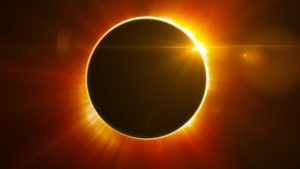There has been a lot of publicity and excitement over the Aug. 21 solar eclipse. Millions of people are planning to view the first total solar eclipse visible from the U.S. in nearly 40 years. However, there are risks – the biggest being permanent vision loss, or “solar retinopathy” – that I feel compelled to bring to your attention.
On a sunny day, if you take a glimpse of the sun, you have a second or two before the brightness and/or pain cause you to look away. The worrisome part about a solar eclipse is that it’s partially blocked by the moon, which causes it to be less bright. This tricks your eyes into thinking you can look at it for a longer period of time. The reality is that the UV rays are still as strong and are burning your retina as your stare.
Solar retinopathy is similar to a sunburn. You don’t feel the effects of the UV rays until several hours later, which could include blind spots or hazy, blurred vision. The worst part is the damage is not treatable.
The good news is that there is a way to view the eclipse safely; that is, by wearing ISO-compliant glasses. This website has a list of brands, vendors and retail stores that manufacture and sell ISO-compliant glasses. An important note: the glasses should list the ISO certification and manufacturer’s information. Many companies are making and selling non-compliant glasses. Regular sunglasses also will not offer the protection you need, nor will “quick glances.” NASA provides additional safe viewing tips.
Please educate yourselves and protect your eyes, especially when it comes to your children. DO NOT let them remove the glasses under any circumstances while watching the eclipse. According to NASA, “the only time the Sun can be viewed safely with the naked eye is during a total eclipse, when the Moon completely covers the disk of the Sun. It is never safe to look at a partial or annular eclipse, or the partial phases of a total solar eclipse, without the proper equipment and techniques.” For our local patients, it’s important to know that Virginia will not experience a total eclipse. This means, there will not be a moment where it is safe to view the eclipse without eye protection. For those of you reading this from outside the Commonwealth, search this website for your location to find out if a total eclipse is expected; however, keep in mind that even when the Sun is 99% obscured, the small crescent showing has enough radiation to cause retinal burning.
If you have any questions, feel free to call us at the office. Enjoy the magnificent view on Monday, but please be safe!


